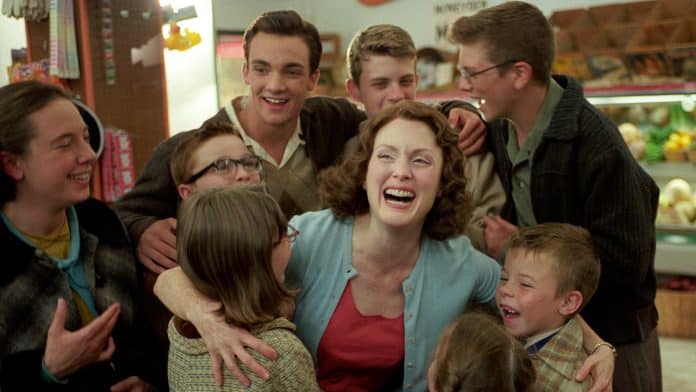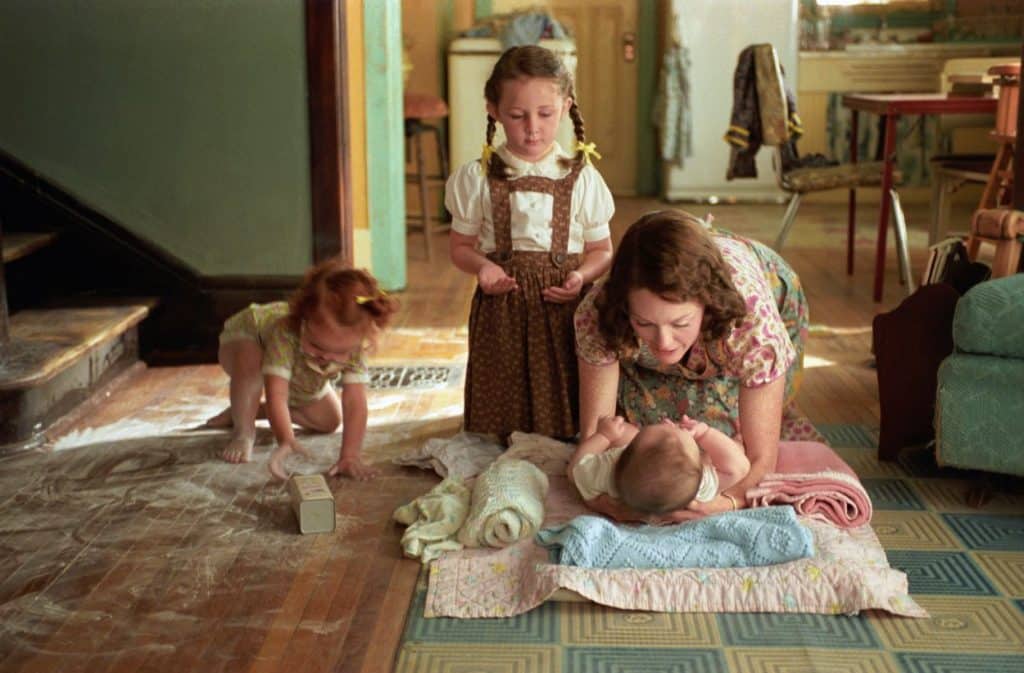Is ‘The Prize Winner of Defiance, Ohio’ a True Story? – “The Prize Winner of Defiance, Ohio” is a 2005 biographical film directed by Jane Anderson, based on Terry Ryan’s true-life memoir of the same name. Julianne Moore, Woody Harrelson, and Laura Dern play key roles in this film adaptation of Ryan’s captivating story.
“The film takes place during the 1950s and centers around Evelyn Ryan (played by Julianne Moore), a resilient housewife and mother of ten in Defiance, Ohio. However, Evelyn faces significant challenges due to her husband Kelly Ryan’s (Woody Harrelson) alcoholism and reckless spending, which puts their family’s financial well-being at risk.
“The Prize Winner of Defiance, Ohio” is an uplifting and inspirational film that celebrates the strength of the human spirit, resilience, creativity, and family bonds. It offers valuable insights into the struggles faced by families during the 1950s while also showcasing the innovative solutions individuals created to overcome those challenges.
Overall, “The Prize Winner of Defiance, Ohio” is an inspiring and moving film that celebrates an exceptional woman and her ability to overcome adversity through talent and perseverance. Viewers may wonder if there is any truth behind its tale. Let’s find out.
True Story Behind “The Prize Winner of Defiance, Ohio” Movie
“The Prize Winner of Defiance, Ohio” is a movie based on true events. It tells the tale of Evelyn Ryan, a real woman who gave birth to ten children. Jane Anderson herself adapted the screenplay from Terry “Tuffy” Ryan’s biography, “The Prize Winner of Defiance, Ohio: How My Mother Raised Ten Kids on 25 Words or Less,” published in 2001. Although Evelyn challenged gender norms during this era, her primary concern remained to provide for her family.
In an interview, Terry Ryan recalls when their landlord suddenly forced them to vacate their two-bedroom apartment on Latti Street in Defiance. They were struggling financially and with housing. Fortunately, luck came their way when Evelyn won first place at the Western Auto Bicycle event, earning $5,000 as a prize. They used this money as a down payment to purchase a house where Evelyn lived for the next 45 years. In addition to the prize money, she also won a bicycle, a washer machine, and a dryer.
Though Terry Ryan’s memoir heavily influenced the film’s plot, the screenplay does not strictly adhere to a word-for-word adaptation. Director Jane Anderson took creative liberties to craft the story, drawing on her conversations with Terry Ryan to gain emotional context and conduct research. These discussions with Terry Ryan helped shape the script, where two key themes emerged: the idea of a ‘woman of independent happiness’ and the notion that suffering is not an inevitable choice. These themes contribute to the film’s unique tone of storytelling.
“The Prize Winner of Defiance, Ohio” features Julianne Moore narrating directly into the camera, reminiscent of television commercials from the 1950s and 1960s. Producer Robert Zemeckis originally intended to direct the film himself but asked Jane Anderson to study advertisements for visual inspiration. As a result, scenes were structured to resemble Evelyn addressing her audience directly.
Visually striking portions from the book were used to craft the film, such as the Tulip Incident, which beautifully conveys disappointment while finding beauty in everyday moments. Julianne Moore’s portrayal of Evelyn Ryan possesses elegance and warmth that transcends any specific era. Her interactions with young actors playing Evelyn’s children are heartwarming and blur the lines between fiction and reality.
Julianne Moore recently shared in an interview on CBS’s ‘The Early Show’ that Evelyn Ryan continues to be an incredible source of inspiration. Evelyn accomplished so much while maintaining a positive and grateful outlook on everyday experiences. Her remarkable journey is a testament to her tenacity, optimism, and defiance in facing daunting obstacles. Through ‘The Prize Winner of Defiance, Ohio,’ Evelyn Ryan’s extraordinary story will undoubtedly inspire and resonate with future generations.
Must See: Is Tag (2018) Film Based on a True Story?















